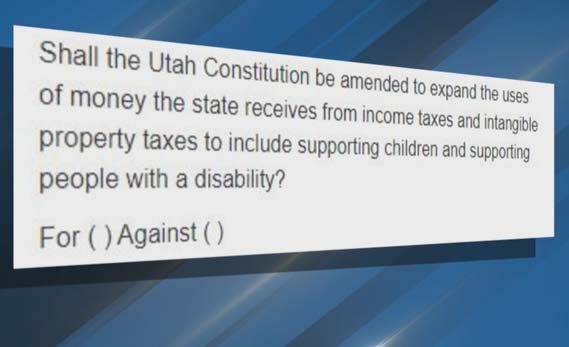
SALT LAKE CITY – The advocacy group Voices for Utah Children has joined a growing chorus of special interests opposing the Amendment G measure on the November general election ballot.
The group’s analysts say that diverting funds from income tax revenues earmarked for education makes “no sense” from a dollars and cents point of view.
“State budget writers have long sought greater flexibility to move moneys around …” according to Voices fiscal expert Matthew Weinstein. “That means the ability to shift up to $600 million annually out of what is already the worst funded education system in America … Funding should be increased, not diverted, so that we can address growing gaps between haves and have-nots and gaps between whites and non-whites that are larger.”
Amendment G is one of seven constitutional amendments on the ballot in the upcoming general election. If approved by voters, that measure would allow lawmakers to spend state income tax revenue on programs to benefit children and disabled Utahns. The Utah Constitution has traditionally reserved those funds exclusively for public and higher education.
Organized in 1985, Voices for Utah Children is a non-profit group dedicated to “making Utah a place where all children thrive.” The group’s advocacy efforts focus primarily on the areas of health care, school readiness, safety, economic stability and diversity.
“The unfortunate reality …” says Voices chief executive officer Maurice “Moe” Hickey, “is that nearly every area of state responsibility where children are impacted … is dangerously underfunded.”
Voices analysts say that the fact that proponents of Amendment G are promising that its approval will mean more money for education and more money for social services should be a red flag for Utah voters.
“How does the math work on that?” Weinstein asks. “Where will all these additional revenues come from?”
Republican officials and legislative leaders, including Lt. Gov. Spencer Cox, support Amendment G as a necessary follow-up to pledges made to Utah’s education community during the 2020 general session of the Legislature.
During the 2020 legislative session, Cox has explained, lawmakers negotiated with stakeholders in the education community (e.g. the State Board of Education, the Utah Education Association, the Parent Teachers Association and school district administrators) to obtain their agreement to also fund services for children and disabled persons from income tax revenues in exchange for promises of increased funding for public education in the future.
Despite the economic disruption caused by the coronavirus, the lieutenant governor added, the Legislature demonstrated its commitment to public education during its most recent budget-balancing special session by actually increasing education funding by 2 percent for 2021.
According to polling by UtahPolicy.com for KUTV 2News, about 46 percent of Utah voters favor Amendment G, while 35 percent oppose the measure and 19 percent are undecided.
A statement from Voices for Utah Children released Tuesday argued that the state’s K-12 public education system has ranked last in the nation in per-pupil investment since 1988. The group attributes that funding shortfall to the fact that “Utah’s overall level of taxation is now at its lowest level in 50 years relative to Utahns’ incomes, following multiple rounds of tax cutting.”
Weinstein added that a recent survey by the Utah Foundation revealed that 75 percent of Utahns oppose more tax cuts and are willing to pay higher taxes to fund education, air quality and transportation improvements.
The other amendments on the November ballot include Amendment A (making the language of the state Constitution gender neutral), Amendment B (specifying the qualifications of a legislator), Amendment C (repealing a constitutional exception that allowed involuntary servitude as punishment for a crime), Amendment D (specifying circumstances under which a municipality may commit water rights or supply water outside its boundaries), Amendment E (creating a constitutional right to hunt and fish) and Amendment F (giving lawmakers authority to set the start date for legislative sessions).

